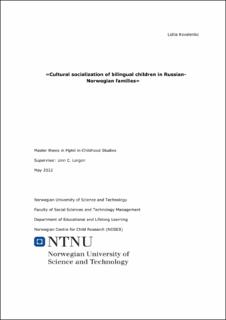| dc.description.abstract | This master’s thesis explores the perspectives of children who were born in multicultural families and what obstacles and advantages they meet during childhood. I did research with children who were born in Russian-Norwegian families and in this thesis, I explore the ways these children perceive Russian culture while growing up in Norway.
The aim of the thesis is to look at bilingualism as a social and cultural phenomenon and how this phenomenon shapes the space of childhoods. The master thesis represents the nature of bilingualism from the point of view of children and how knowledge of two languages as mother tongues shapes their social world.
The master thesis shows how the socio-structural aspect of children, their agency and living as social actors is not left without a major influence by those surrounding them and caring for them in the first place - their families. The multicultural lifestyles of families that are the context for the process of cultural identity formation of children, include languages and cultural diversity. The methods of how those languages and other elements of culture are incorporated in the daily life of the family are often unique for each family individually. Agency of bilingual and bicultural children is also present and active when facing negotiations of more than two cultures and two languages as a standard way of life. | |
